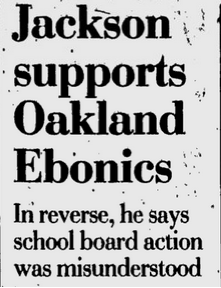In 1996, the Oakland School Board in Oakland, California passed a resolution regarding a linguistic variety known as “ebonics.” Ebonics — a portmanteau combining the words ebony and phonics — is a dialect which linguists refer to as African American Vernacular English (AAVE). AAVE is a dialect associated with African-American speakers of English. This is not to say, of course, that all African-Americans use AAVE or that all users of AAVE are African-American, but it is a robust dialect among African-Americans in the US. The Oakland School Board declared Ebonics a language in order to raise its status, because languages have more prestige than “dialects.” The school board announced their goal of “maintaining the legitimacy and richness of such language… and to facilitate their acquisition and mastery of English language skills.”
This ideological position would have several practical implications — teachers with knowledge of Ebonics could possibly be paid more, funds would be used to teach all teachers Ebonics, and this knowledge of Ebonics would be applied in teaching students Standard English. Instead of treating Ebonics as a lazy form of English, it would be recognized as a legitimate form of language in its own right, with patterns and systematicity equal to those of Standard English. Students who speak Ebonics at home would not be required to learn Standard English seemingly by osmosis, but rather would be taught the specifics of the standard dialect explicitly.
The Oakland Ebonics Resolution was forward-thinking, progressive, practical, and scientifically and pedagogically sound. It addressed a major source of inequality in the school system and sought to lessen the Black-White education gap dramatically. But the public hated it.
The resolution elicited criticism from many, uniting political leaders from both the right and the left. It was denounced by civil rights leader the reverend Jesse Jackson, Maya Angelou, Joe Lieberman, the Clinton administration, and Secretary of Education William Bennett. Critics argued that we were dumbing down standards in our schools, and civil rights leaders worried that we were failing our African-American students by discouraging them from learning Standard English. Misunderstandings abounded, especially the notion that all instruction would be done in Ebonics. People worried that Ebonics speakers would be put in ESL courses.
In response to this backlash, the Linguistic Society of America passed a resolution in January of 2007. The largest meeting of professional linguists in the country agreed unanimously that the Oakland school board was correct in their decision and lent their support as language professionals.
The systematic and expressive nature of the grammar and pronunciation patterns of the African American vernacular has been established by numerous scientific studies over the past thirty years. Characterizations of Ebonics as “slang,” “mutant,” “lazy,” “defective,” “ungrammatical,” or “broken English” are incorrect and demeaning… the Oakland School Board’s decision to recognize the vernacular of African American students in teaching them Standard English is linguistically and pedagogically sound.
Linguists went to work trying to change the minds of the American public. They wrote op-eds, talked to journalists, did interviews on TV. They reached out to political leaders. As a result of this push to educate the public, Rev. Jesse Jackson changed his opinion and announced his support for the school board decision.
Misunderstandings about the Oakland Ebonics resolution are based on standard language ideology. Even 9 years after the decision, there is still animosity towards the decision and towards Ebonics/AAVE. However, from a linguist’s perspective, the resolution could have a world of difference for kids who struggle to learn Standard English because their home variety is seen as broken and lazy.


